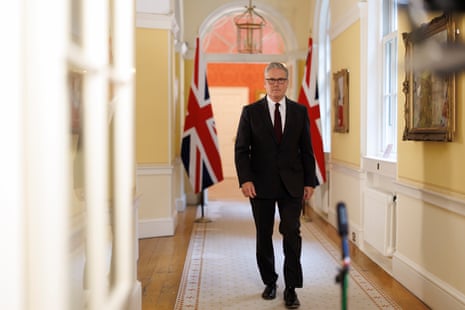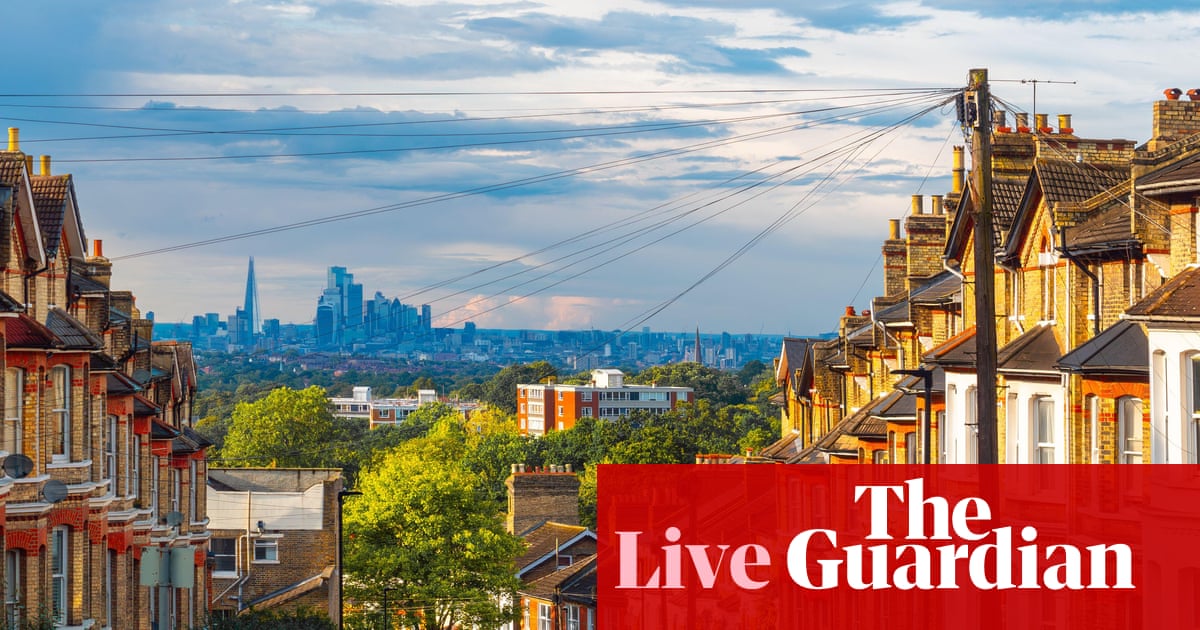Starmer says digital ID cards an 'enormous opportunity' for UK and will make working illegally tougher
Keir Starmer says plans for a new digital ID held on people’s phones will be an “enormous opportunity” for the UK and make working illegally tougher.
Digital ID will become mandatory as a means of proving the right to work under the plans, but people will not be required to carry or asked to produce it. It will be available to UK citizens and legal residents by the end of this parliament, reports the PA news agency.
Starmer said:
I know working people are worried about the level of illegal migration into this country. A secure border and controlled migration are reasonable demands, and this government is listening and delivering.
Digital ID is an enormous opportunity for the UK. It will make it tougher to work illegally in this country, making our borders more secure.
And it will also offer ordinary citizens countless benefits, like being able to prove your identity to access key services swiftly – rather than hunting around for an old utility bill.
Starmer admitted Labour has previously shied away from addressing concerns over immigration said it is now “essential” to tackle “every aspect of the problem of illegal immigration” in an article for The Telegraph.
The prime minister argued that it is possible to be concerned about immigration while rejecting Reform UK’s “toxic” approach. “There is no doubt that for years left-wing parties, including my own, did shy away from people’s concerns around illegal immigration,” he wrote.

Reform UK called the plans a “cynical ploy” designed to “fool” voters into thinking something is being done about immigration. Tory leader Kemi Badenoch also dismissed the plans as a “gimmick that will do nothing to stop the boats”.
The Liberal Democrats said they would not support mandatory digital ID where people are “forced to turn over their private data just to go about their daily lives”.
Meanwhile, Tony Blair’s thinktank said the cards, which will be mandatory by the end of this parliament, could act as a “gateway to government services”.
More on this story in a moment, but first here are some other developments:
-
Ministers are pushing through powers to photograph, name and shame offenders who have been ordered to complete unpaid community work in England and Wales. The sentencing bill, now moving through parliament, will for the first time give probation officers “a legal power” to take and publish the names and pictures of individuals ordered by courts to tidy grass verges, litter-pick or scrub graffiti.
-
Leading climate figures and Labour MPs have urged Keir Starmer to attend the crucial Cop30 climate summit this November, after aides advised him not to attend for fear of attracting the ire of the Reform party. Simon Stiell, the UN’s climate chief, said: “Cop30 is where leaders are expected to come and roll up their sleeves, make deals to help their nation’s economy transition faster, creating more jobs, and guide the world on what next steps we take together.”
-
Britain will violate its nuclear disarmament obligations if Labour presses ahead with the £1bn purchase of 12 F-35A fighter jets, according to a specialist legal opinion prepared on behalf of the Campaign for Nuclear Disarmament (CND). Two international lawyers argue that the government’s plan to reintroduce air-launched nuclear weapons for the RAF will break a key provision of the nuclear non-proliferation treaty (NPT) signed by the UK and 190 other countries.
-
Hopes that international rail services could return to UK stations abandoned by Eurostar have grown, with the government backing new competitors who plan to serve stops in Kent. Ministers have been leaning on the rail regulator to give crucial space on the railway to prospective entrants who pledge to bring cross-Channel services back to Ashford and Ebbsfleet stations – and possibly London’s Stratford International.
Key events Show key events only Please turn on JavaScript to use this feature
Lisa Nandy insists digital ID 'will not be mandatory for people to use'
All UK citizens will have a digital ID under new plans, but it will be “entirely their choice” whether they use it, culture secretary Lisa Nandy told Sky News:
The plan is to ensure that everybody has it, but you can choose whether you use it.
She referred to debates over identity cards that go back to when Tony Blair was prime minister between 1997 and 2007. Nandy said:
We’ve debated it ever since. It’s important, of course, that we protect people’s civil liberties, and we have got no intention of pursuing a dystopian mess. But I do think for most people, this is a fairly common sense and practical measure.
And like I said, although all UK citizens will have a digital ID, it will not be mandatory for people to use it. It will be entirely their choice.

Introducing digital IDs will not change what penalties companies face for failing to check their employees’ right to work, a cabinet minister has said.
Culture secretary Lisa Nandy told Times Radio:
Companies already are meant to check on whether people have the right to work in the UK and face penalties for that … they will continue to face those penalties.
But she said it would make it easier for businesses to do their checks:
It makes it much easier for companies to be able to do this and to be able to check whether people are able to work legally or not, which means there is no excuse for not doing so.
The cards will be free of charge, she said and funded under existing spending plans.

Robert Booth
It is 21 years since Tony Blair’s government made proposals for an ID card system to tackle illegal working and immigration, and to make it more convenient for the public to access services.
The same issues are on the agenda again as Keir Starmer revives what became one of New Labour’s most controversial policies. He is about to find out if he can defeat the argument that David Cameron’s Conservatives made before scrapping it. They said the ID card approach to personal privacy was “the worst of all worlds – intrusive, ineffective and enormously expensive”.
Blair is an important figure in the latest push, through lobbying carried out by his Tony Blair Institute (TBI).
The idea re-emerges in a different technological world in which smartphones are ubiquitous and much, but far from all, of the population is familiar with negotiating digital credentials.
Starmer appears ready to try again, and ministers believe there will be less public opposition, although digital ID cards could worsen the effect of digital exclusion.
Age UK has estimated that about 1.7 million people over the age of 74 do not use the internet. TBI’s arguments in favour are that far from reflecting the “papers, please” caricature, digital ID “brings fairness, control and convenience to people’s everyday interactions with each other and with the state”.
It can close loopholes exploited by trafficking gangs, reduce pull factors driving illegal migration to Britain, speed up citizens’ interactions with government, reduce errors and identity fraud and boost trust as a tangible symbol of a more responsive and flexible state.
The arguments against often centre on privacy. Civil liberties campaigners fear any mandatory ID card system, even one intended to tackle illegal migration, would require the population to surrender vast amounts of personal data to be amassed in national databases.
Robert Booth is the Guardian’s UK technology editor. You can read more of his analysis here:

Rowena Mason
The prime minister will set out the measures on Friday at a conference on how progressive politicians can tackle the problems facing the UK, including addressing voter concerns around immigration.
The proposals for a “Brit card” would require legislation and are already facing opposition from privacy groups.
However, No 10 is understood to believe that it is necessary to make sure people have the right to work in the UK to tackle illegal migration, and that the national mood has moved on since Tony Blair’s plans for ID cards were abandoned in the 2000s.
Starmer said this month that digital IDs could “play an important part” in making Britain less attractive to illegal migrants, and France has repeatedly claimed that the lack of official cards acts as a “pull factor”.
The prime minister has also spoken about the government’s goal of “patriotic renewal”, comparing it to “the politics of grievance, of toxic divide, which is what Reform are all about”. He dismissed the Conservative party as “basically dead”.
During his speech on Friday, he will set out his view that the far right is injecting a “poisonous” discourse into national life, saying:
At its heart – its most poisonous belief – on full display at the protests here in London, just a week or two ago, that there is a coming struggle, a defining struggle, a violent struggle for the nation. For all our nations.
Now – you don’t need to be a historian to know where that kind of poison can lead. You can just feel it. A language that is naked in its attempt to intimidate.
But he will also explain his belief that immigration and borders need to be controlled, saying:
For too many years it’s been too easy for people to come here, slip into the shadow economy and remain here illegally.
Starmer will add:
It is not compassionate leftwing politics to rely on labour that exploits foreign workers and undercuts fair wages. But the simple fact that every nation needs to have control over its borders.
What do the digital ID cards entail?
Starmer’s plans envisage ID cards being stored on devices in the same way contactless payment cards or the NHS app are.
The digital ID would be the authoritative proof of identity and residency status in the UK and include name, date of birth, and a photo as well as information on nationality and residency status, reports the PA news agency.
How the scheme will work for those who do not use smartphones will be addressed as part of the consultation process.
Those who do not want to carry a digital ID card or do not operate digitally could be given a physical card instead, according to The Telegraph.
Mandatory ID cards have previously only existed during wartime.
Starmer says digital ID cards an 'enormous opportunity' for UK and will make working illegally tougher
Keir Starmer says plans for a new digital ID held on people’s phones will be an “enormous opportunity” for the UK and make working illegally tougher.
Digital ID will become mandatory as a means of proving the right to work under the plans, but people will not be required to carry or asked to produce it. It will be available to UK citizens and legal residents by the end of this parliament, reports the PA news agency.
Starmer said:
I know working people are worried about the level of illegal migration into this country. A secure border and controlled migration are reasonable demands, and this government is listening and delivering.
Digital ID is an enormous opportunity for the UK. It will make it tougher to work illegally in this country, making our borders more secure.
And it will also offer ordinary citizens countless benefits, like being able to prove your identity to access key services swiftly – rather than hunting around for an old utility bill.
Starmer admitted Labour has previously shied away from addressing concerns over immigration said it is now “essential” to tackle “every aspect of the problem of illegal immigration” in an article for The Telegraph.
The prime minister argued that it is possible to be concerned about immigration while rejecting Reform UK’s “toxic” approach. “There is no doubt that for years left-wing parties, including my own, did shy away from people’s concerns around illegal immigration,” he wrote.

Reform UK called the plans a “cynical ploy” designed to “fool” voters into thinking something is being done about immigration. Tory leader Kemi Badenoch also dismissed the plans as a “gimmick that will do nothing to stop the boats”.
The Liberal Democrats said they would not support mandatory digital ID where people are “forced to turn over their private data just to go about their daily lives”.
Meanwhile, Tony Blair’s thinktank said the cards, which will be mandatory by the end of this parliament, could act as a “gateway to government services”.
More on this story in a moment, but first here are some other developments:
-
Ministers are pushing through powers to photograph, name and shame offenders who have been ordered to complete unpaid community work in England and Wales. The sentencing bill, now moving through parliament, will for the first time give probation officers “a legal power” to take and publish the names and pictures of individuals ordered by courts to tidy grass verges, litter-pick or scrub graffiti.
-
Leading climate figures and Labour MPs have urged Keir Starmer to attend the crucial Cop30 climate summit this November, after aides advised him not to attend for fear of attracting the ire of the Reform party. Simon Stiell, the UN’s climate chief, said: “Cop30 is where leaders are expected to come and roll up their sleeves, make deals to help their nation’s economy transition faster, creating more jobs, and guide the world on what next steps we take together.”
-
Britain will violate its nuclear disarmament obligations if Labour presses ahead with the £1bn purchase of 12 F-35A fighter jets, according to a specialist legal opinion prepared on behalf of the Campaign for Nuclear Disarmament (CND). Two international lawyers argue that the government’s plan to reintroduce air-launched nuclear weapons for the RAF will break a key provision of the nuclear non-proliferation treaty (NPT) signed by the UK and 190 other countries.
-
Hopes that international rail services could return to UK stations abandoned by Eurostar have grown, with the government backing new competitors who plan to serve stops in Kent. Ministers have been leaning on the rail regulator to give crucial space on the railway to prospective entrants who pledge to bring cross-Channel services back to Ashford and Ebbsfleet stations – and possibly London’s Stratford International.

 3 months ago
71
3 months ago
71

















































